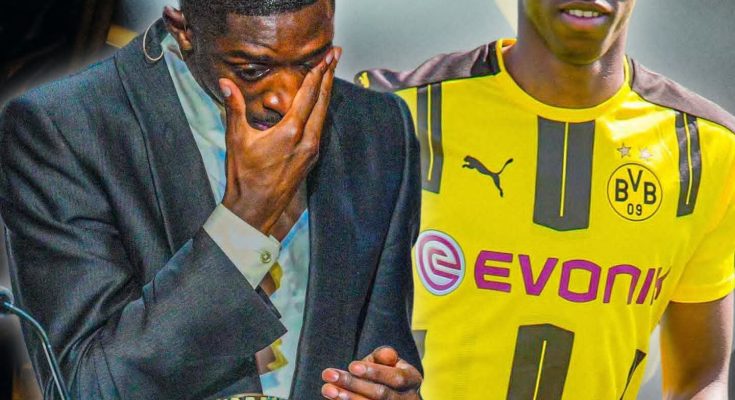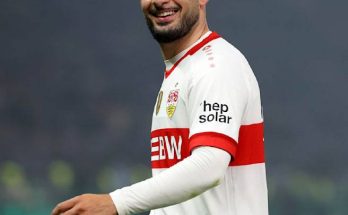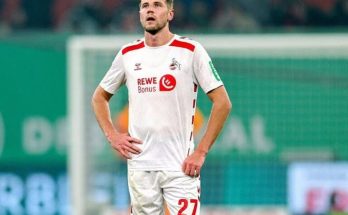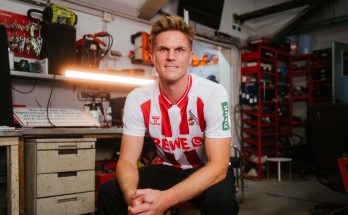In an unexpected twist, Borussia Dortmund is reaping the financial rewards of Ousmane Dembélé’s triumph at the Ballon d’Or, which has sent shockwaves throughout European football. The news of his victory not only solidifies Dembélé’s status as one of the world’s premier football talents but also opens up an entirely new chapter in the financial history of his former club. While the spotlight is on Dembélé for his incredible individual achievement, the real beneficiaries of his rise to stardom are the Dortmund coffers, which are now brimming with an influx of funds they never anticipated. This is a story of how one player’s success can affect the financial landscape of an entire club, its stakeholders, and the football world at large.
When Dembélé left Borussia Dortmund in 2017 to join Barcelona for a staggering €105 million, it was seen as a significant step in his career. However, few could have predicted that the deal would become a major windfall for Dortmund seven years later. The deal, though financially substantial at the time, was laced with clauses that would come to benefit the German club significantly if Dembélé ever achieved a monumental milestone such as winning the Ballon d’Or. These clauses, which many thought were just another piece of standard contract negotiation tactics, have turned out to be a game-changer for Dortmund.
As part of the terms of the transfer, Dortmund had negotiated a series of performance-related add-ons. The clause that is now making headlines was triggered by Dembélé’s Ballon d’Or victory, a scenario that no one could have foreseen when he first made the move to Barcelona. The add-on clauses, combined with a percentage of future transfer fees and various commercial bonuses, have culminated in a massive financial payout that has left Dortmund officials scrambling to count the zeros in their bank accounts.
To understand the magnitude of this windfall, it’s essential to consider the implications of Dembélé’s Ballon d’Or win in the context of his transfer history. When the French winger moved to Barcelona, he was already being hailed as one of the brightest young stars in world football. His potential was undeniable, and while there were concerns about his consistency, his natural talent was seen as a ticking time bomb waiting to explode. Dembélé’s Ballon d’Or triumph is the culmination of years of hard work, resilience, and talent, but for Borussia Dortmund, it represents something much more—an unexpected cash influx that has already started to reshape their financial future.
The money generated by Dembélé’s individual success is coming from several sources. First and foremost, the add-on clauses tied to his initial transfer are substantial. While the exact amount is confidential, reports suggest that Borussia Dortmund stands to receive tens of millions of euros from this alone. In addition, Dortmund has a percentage of any future transfer fees that Barcelona might receive for Dembélé if he were ever to leave the club. This is a common clause in high-profile transfers, but it rarely pays off so handsomely. In Dembélé’s case, the clause has been activated to the fullest extent thanks to his historic achievement, which has now made him an even more valuable asset.
But the story doesn’t end there. Dembélé’s Ballon d’Or win has also significantly boosted his commercial value, creating a ripple effect that Dortmund is now feeling. The global attention on Dembélé has sparked a surge in demand for his merchandise, particularly jerseys. This is a crucial point for Borussia Dortmund because the club retains a portion of the revenue from player-related merchandise. As Dembélé’s profile continues to soar, so too does the club’s revenue from his brand. The positive media coverage surrounding his victory has also led to a surge in interest from sponsors, who are now clamoring to tie their names to Dembélé’s brand and, by extension, Borussia Dortmund’s.
The impact of Dembélé’s success goes beyond just merchandise sales. The commercial buzz surrounding his Ballon d’Or win has made Dortmund an even more attractive proposition for potential sponsors, especially in global markets. The club’s ability to attract new sponsorship deals has increased exponentially, with multiple major brands already in talks with the club for long-term partnerships. The exposure Dortmund gains through its association with Dembélé, now a household name, has elevated their status among the elite football clubs of Europe, enhancing their ability to negotiate better financial terms for future deals.
The financial windfall doesn’t stop with commercial revenue. The increased media coverage, sponsorship deals, and merchandise sales are expected to give Borussia Dortmund the financial flexibility to make moves in the transfer market. The club has already signaled its intent to reinvest the incoming money in future talent, with a particular focus on bolstering their attacking options. Having already established a reputation for developing young talent into world-class players, Dortmund is well-positioned to take advantage of the financial boost they have received.
It’s worth noting that Dortmund’s financial structure has always been based on a blend of shrewd business moves and smart player development. The club has often been able to outmaneuver larger, wealthier clubs by identifying undervalued talent and nurturing them to stardom. The proceeds from Dembélé’s Ballon d’Or win are expected to fuel a new era of investment in young talent, which could keep the club competitive in European and domestic football for years to come. In fact, there’s even speculation that Dortmund could use part of the newfound wealth to go after a marquee signing, signaling that the club is no longer solely reliant on player development to remain competitive.
For Dembélé, his Ballon d’Or victory is not only a personal achievement but also a moment of redemption. His time at Barcelona had been marred by injuries, inconsistency, and occasional friction with the club’s management, but he has managed to rise above the noise and become one of the best players in the world. His victory is a testament to his talent and resilience, and it sends a powerful message to young footballers everywhere: that with the right mentality and work ethic, anything is possible.
It also shows the unpredictable nature of football finance. While many people focus on the direct financial benefits of high-profile transfers and signings, it’s often the indirect gains—such as clauses in contracts and performance-based add-ons—that end up delivering the most significant financial rewards. In Dembélé’s case, Borussia Dortmund has managed to capitalize on a series of contingencies that have made the club richer than it ever could have imagined when the player initially left.
The ripple effect of Dembélé’s success is being felt throughout Europe. While some clubs are envious of Dortmund’s unexpected fortune, others are closely studying the structure of his transfer deal to see if they can replicate a similar business model in the future. For many, this is a wake-up call, a reminder that the financial world of football is as unpredictable as the sport itself. Dembélé’s rise to the top has proven that success is not just about what happens on the pitch but also about how clubs can strategically position themselves to reap the rewards of their players’ achievements.
As the money continues to flow into Borussia Dortmund’s bank account, there’s no denying that this moment will be remembered as a turning point in the club’s financial history. The impact of Dembélé’s Ballon d’Or win will reverberate across Europe, not just because of the money but because of the message it sends to the football world: that every transfer, every contract, and every piece of business has the potential to lead to unforeseen rewards. For Borussia Dortmund, that reward has arrived in the form of a financial windfall that could shape the future of the club for years to come. In the end, the true winners are not just Dembélé and his fans, but Borussia Dortmund and its future as a European powerhouse.



